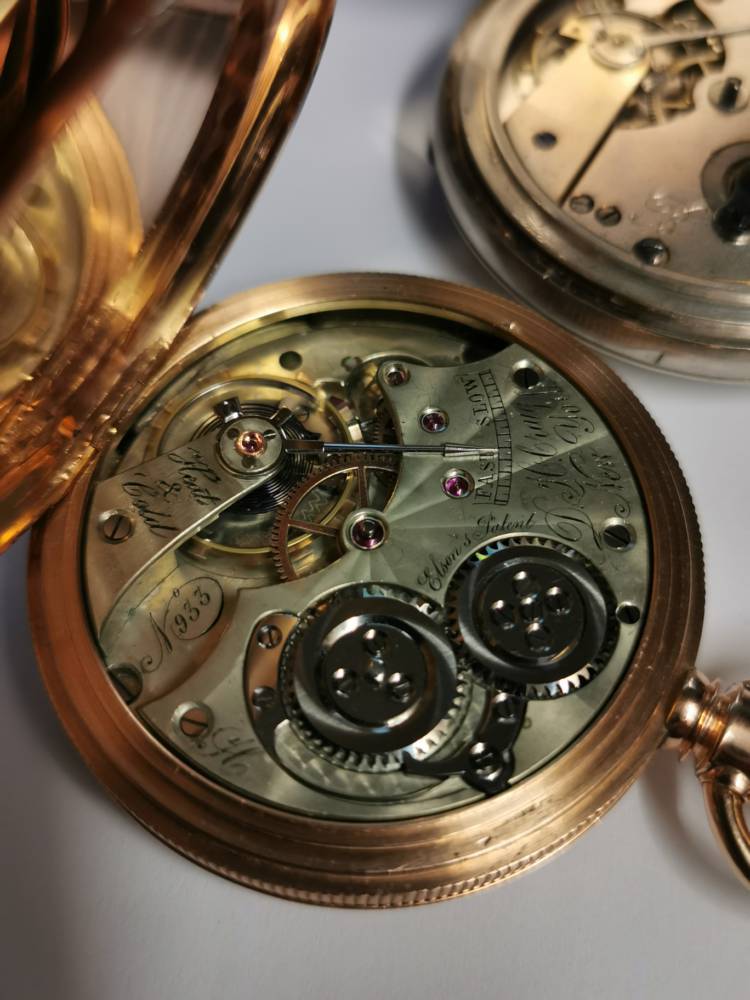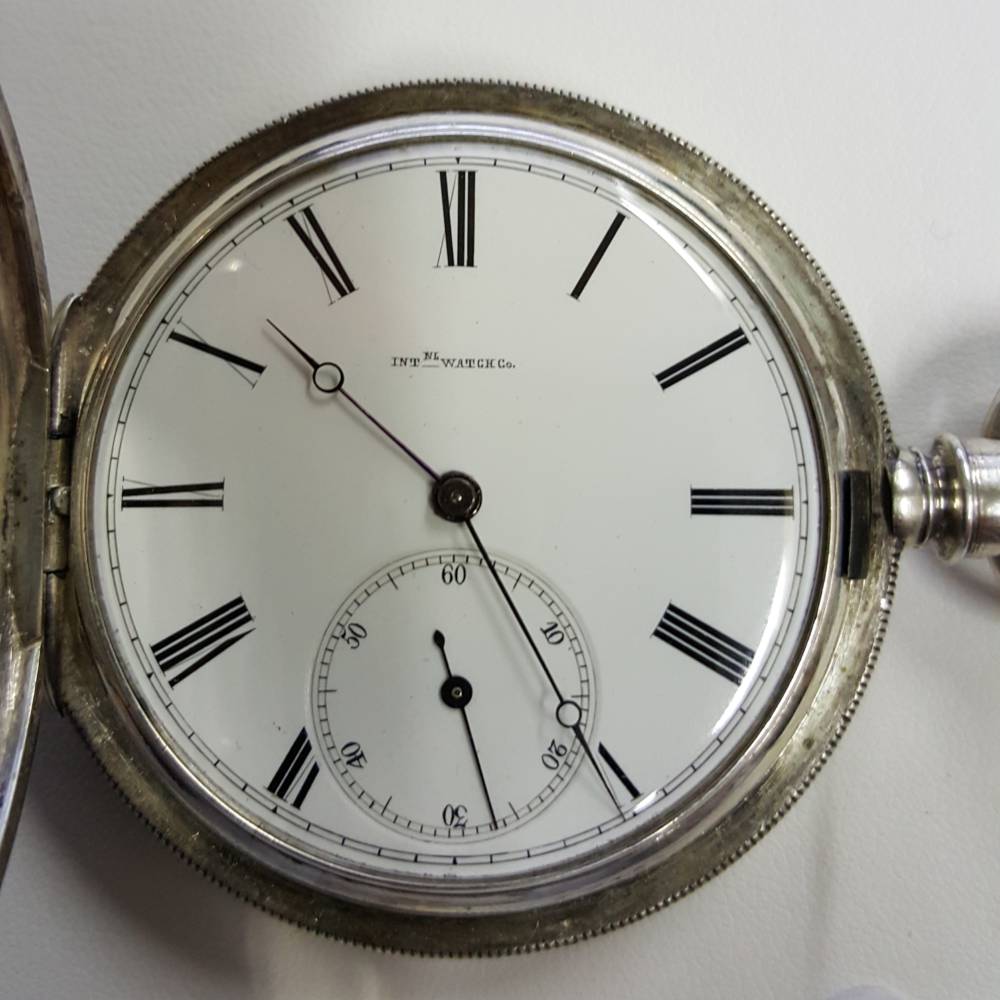So happy that I could add these two to my collection.
A very early Jones with number 933, pattern H, in amazing condition.
And a pattern B, Henry Burns, a key wind, key set Jones. Case in coin silver.



So happy that I could add these two to my collection.
A very early Jones with number 933, pattern H, in amazing condition.
And a pattern B, Henry Burns, a key wind, key set Jones. Case in coin silver.



This pattern R Jones came earlier this year in the collection.


Hi Tonny,
Congratulations on these beautiful pocket watches. I wonder if you could
educate me regarding the different patterns- what are the differences between
the pattern B, H, or others? Also, how many different patterns were produced?
Thanks, Nelson
Hi Nelson,
The different letters used to indicate different patterns were E, H, D, R, B,
C and S.
Jones employed a letter to indicate different aspects of the construction, so
also a difference in quality.
As you know, the first Jones watches made were of the highest possible
quality. Later was chosen to also make more watches at lower pricepoints.
The differences are f.i; in the number of jewels used, the type of balance
spring...
Not all the Jones movements have a letter engraved.
More can be found in the excellent book F.A. Jones by David Seyffer, Thomas
Konig and Alan Myers, about the leeters from page 72.
Here is another pattern B from my collection


The pattern letter is sometimes not engraved, especially in movements with
nummers above 12000.
Here is an example from my collection with nr 23399 without a pattern letter.

 a pattern S
a pattern S
with serial 17141 from the collection
Hi Tonny,
An impressive Jones collection!
Regards,
Adrian,
(alwaysiwc)
Such an amazing and ever expanding collection of pocket watches.
Congratulations on the new additons.
Thanks, Tonny. So is the order of the quality, from best quality to lower
quality as listed: E, H, D, R, B, C, and the lowest quality S?
Nelson
Hi Nelson,
Pattern 'C' is the lowest quaility, but also the rarest to find.
Not so many were made and because they were considerably lower in quality
(9-11) jewels, these watches had not the typical Jones quality.
They were produced or at least finished by Seeland who tried to reduce cost of
production.
This may explain their rarity nowadays. Once broken, watchmakers might have
said that repair was not worthwhile.
At this moment less than 10 pattern 'C' watches are know among Jones
collectors.
Regards,
Adrian
(alwaysiwc).
Hi Nelson,
Above is a calibre Jones, pattern 'C', key wind.
It has 11 jewels and therefore the quality is lower.
Regards,
Adrian,
(alwaysiwc).
Most interesting to see such a rare, if not quality, watch. Thanks for the
information and photo.
I have only one Jones watch, and I'll open it to see what designation it has.
Nelson
Here is my one and only Jones, a "S" model- It is in pristine condition, and
came from one of the Forum's most respected members:

The beautiful dial, with the cursive- so classy.
Nelson

Thanks gentlemen, very very handsome pocket watches!
And... thanks for educating me (once more) ;-)
Kind regards, Bob
Hi Nelson,
A few facts about the 'S' pattern, calibre Jones.
The pattern 'R' and 'S' are the most frequently encountered Jones calibres.
Yours is an open face watch ( Lepine) and they are more rare than the hunters.
Rarity is a relative term as it is estimated by Alan Myers that less than 3
percent of all made Jones have been preseved.
Although designed by F.A. Jones, he did not finish any of the Lepines. F.F.
Seeland finished the raw movements and sold them.
The high serial number points also in the direction of Seeland.
The dial logo is as well correct for this watch and period.
In summary, a nice original Jones watch, finished between 1876-78.
Regards,
Adrian.
(alwaysiwc).
Thank you, Adrian, for this information.
Nelson
Some very special pocketwatches here, thank you all for sharing. And huge
congratulations, Tonny, on these amzing additions to your museum!




Thes are pictures of my Jones caliber watch that I sold several years ago. I
do not know where it is today. When I purchased it, I thought it was probably
the top grade but later found that it was not. I also purchased an E that was
in rough condition, but showed a lot of promise.
After about 10 or 12 years, I found a watchmaker who I felt was capable of
doing a proper restoration/conservation of the E. As a first pass, he has
brought the watch to running condition and repaired the mechanism to where it
keeps very good time.
My question at this point is just how scarce is this E model of the Jones. It
is marked International Watch Co. New York Ser. No.5847. It is jeweled to the
center (no chaton on the center) with cap jewels on the pallet arbor and
escape wheel. I believe a complete example was sold by Crott about 12 years
ago but I have not seen any other for sale.
I sold the complete watch thinking that I could not afford to own them both
and really preferred this one even with its rough history and lack of a dial.
One of the things I especially like about it is the finish on the escape
wheel. The recessed hub with polished side faces on the tips of the escape is
a feature my friends and I look for in top grade watches. I do not know when
that design feature was introduced, but it could be that the Jones Caliber E
Model is where it first appeared.

